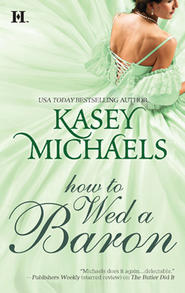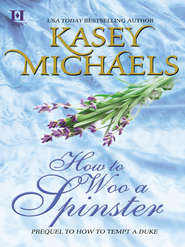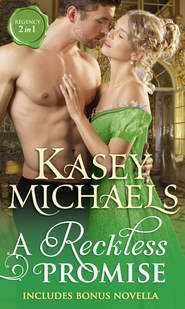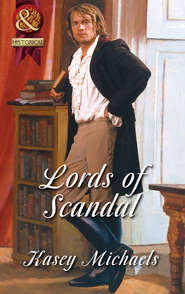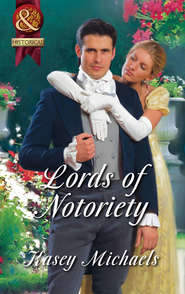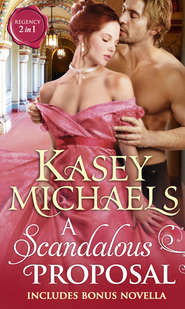По всем вопросам обращайтесь на: info@litportal.ru
(©) 2003-2024.
✖
The Bride of the Unicorn
Настройки чтения
Размер шрифта
Высота строк
Поля
Lord James dragged himself to the edge of the bed, knocking over a candlestick as he groped on the nightstand for the proof that would seal his nephew’s fate, the one piece of evidence that would start him on what Lord James sincerely hoped would prove to be the path to his destruction. The path to destruction for all of them—and the revenge Lord James longed to see, if only from the other side of the grave.
His fingers closed over the pendant, and he fell back against the pillows, holding it out so that the long gold chain swung free. “Here! Here is your proof! I found it around the child’s throat. Take it, nevvy. And then think, damn you. Think!”
Morgan ripped the pendant from his uncle’s hand and held it up so that its gold chain twinkled dully in the candlelight. “It can’t be. I won’t believe it. You could have commissioned a copy. It would be just like you, for you’ve never done one genuine thing in your life. Uncle. Uncle? Do you hear me?”
Lord James was scarcely able to speak. Everything was suddenly moving too fast. Morgan was confusing him. He had wanted to enjoy this moment, draw it out, savor Morgan’s frustration, then leave him with the Gordian knot of the puzzle he had set him. But now he could barely think clearly, and his ears were full of the sound of rushing water.
Fear invaded his senses, washing away the elation, the thirst for revenge. This was real. His death—so long contemplated but never really believed in, never before comprehended for what it represented—was upon him. The pain in his chest was suffocating, pushing him down into a yawning blackness, a total nothingness that terrified him by its absence of recognizable reality.
This was all wrong. He had been wrong. Nothing was playing out as it should. The play was not the thing. Revenge wasn’t sweet. Not at this cost. Never at such a cost. He wanted to live. Longer. A second more. A minute more. Forever. Why? Why should he die?
Oh, God, but he was frightened. More frightened than he had ever been in his life. God? Why had he thought of God? Why had that well-hated name popped into his head? Could there really be a God? Could there be an alternative to nothingness, a substitute for hell? No wonder they had cried, those people he’d killed over the years. It was the terror that had made them cry! The terror of the unknown, the fear of the God he had sworn did not exist.
It was all so real now.
He had been wrong. His revenge against his brother and Morgan wasn’t worth this agony. He didn’t want to go to hell. If there was a hell there had to be a heaven. Why hadn’t he seen that? Morgan was the smart one. Why hadn’t he seen that?
Lord James didn’t want to spend the rest of eternity burning, burning, burning….
Morgan had to find the girl for him! He had to seek redemption for his poor uncle’s most terrible sin, save him from the demons. He’d tell Morgan everything he wanted to hear, tell him now. Tell him the chit’s name; tell him everything he wanted to know; hold nothing back. Confession. He’d give his genuine confession. Confession was good for the soul.
He grabbed at his nephew’s sleeve, trying to anchor himself to life for just a while longer. “Morgan? Could we be wrong? Is there a God? Oh, what if Willy’s right? What if there is a God? What if there is? What if I’m telling the truth? Am I lying? I can’t remember anymore. Help me, Morgan! I can’t remember the truth!”
“Not now, old man,” Morgan said, his voice tight. “Truth or lie, you have to tell me the rest of it, and then I’ll judge for myself.”
“Judge? We’ll all be judged! Save me, Morgan! Save my immortal soul! You already know the name. Check—check the orphanage in Glynde,” Lord James rasped, vainly trying to pull Morgan closer. “In Glynde,” he repeated, his eyes growing wider and wider as he stared up at the ceiling in horror. The demons had migrated, to circle just above him. They were grinning in avid expectation, their long, pointed fangs glinting in the candlelight, the unearthly whoop-whoop-whoop of their black bat wings sucking the air from his lungs.
Lord James heard a sound coming to him as if from a distance. What was it? Oh, yes. Morgan. His dear nevvy was yelling, still asking for proof, his carefully constructed facade of civilization stripped away just as Lord James had foreseen it—yet he could not take pleasure in the sight. For one of the demons was on his chest now, resting on its bony, emaciated haunches, its birdlike legs folded at the knee as it dug razor-sharp talons into him, letting all the remaining air bubble out his mouth, to be followed by a rising river of blood.
“You know. You…must only remember,” Lord James whispered, his voice clogged with blood, with mounting terror. “The murders…our neighbors…the missing child…the searching…”
The play couldn’t be over; the finale had to be rewritten. Yet the curtain had come crashing down…too soon. Too soon. He couldn’t do anything right, even die.
“No one ever told me! I didn’t know!” Lord James shrieked, his voice suddenly strong in his last agony. He felt himself beginning to choke, drowning in the hot liquid that rushed from his ears, from the tin pots—from everywhere in the universe—to pour into his lungs. He clutched at Morgan with a strength born of impossible panic, tearing at the fine white linen of his shirtfront. It had to be the truth. There was a girl—there was! Wasn’t there? “Find her, nevvy—or I’m damned…or we’re both forever damned! Willy…brother…pray for me!”
CHAPTER TWO
Men use thought only to justify their wrongdoings,
and speech only to conceal their thoughts.
Voltaire
THE SUN SHONE BRIGHT as Morgan Blakely and his father, William, duke of Glynde, walked away from the family mausoleum at The Acres, the duke’s ancestral Sussex home. Each man was dressed in funereal black with an ebony satin armband, and each carried his hat while following behind the young minister who had conducted a mercifully short ceremony in the village church.
The duke appeared more than usually frail and wiped at his eyes with a large white handkerchief already banded on all four sides with a thin ribbon of black satin, as if his wardrobe was perpetually prepared for mourning—which, in a way, Morgan realized, it probably was. His father had buried his wife, both his sisters, one of his sons—and now his twin, James—in somewhat less than fifteen years.
Morgan though it must be a depressing way to live, surrounded by all that dying.
He sighed silently and glanced back up the hill at the impressive Italian marble structure that held all his relatives save the one at his side. How long would it be before he took this walk alone, leaving his father’s mortal remains locked behind those airless walls of veined pink stone?
Would his father forgive him—truly forgive him—before he died?
Would he, Morgan, forgive himself? Could he live with himself? Why did he live at all, with Jeremy dead? Were thoughts of revenge enough to keep a man alive? They hadn’t been enough for Uncle James.
But his father was speaking, and for once his tone held no censure, no pity. “It was quite a lovely service, wasn’t it? I had never supposed that the Reverend Mr. Sampson could discover so many pleasant things to say about our dearest brother James.”
“Indeed. I find it remarkable that anyone could summon up a single kind thing to say about the man, Father. And hauling his carcass here to The Acres for interment in the mausoleum is decidedly unnerving, as we have only succeeded in walling him up. Frankly, I would have much preferred to snuggle the bastard twelve or more feet belowground with a boulder or two piled atop his chest, on the off chance he should try to rise again.”
“Morgan! Keep a civil tongue in your head, if you please. We have just buried a man. My brother. My twin. The man with whom I shared our mother’s womb. Had it not been for the vagaries of the birth order, we might well have buried the duke this day.”
“Now, there’s an intriguing thought,” Morgan responded, putting on his hat even as he nodded his goodbye to the minister, who had earlier begged release from any refreshments being served to the mourners after the interment, citing the necessity of attending at the bedside of an ailing villager. “I can only wonder how The Acres would have fared once Uncle James reached his majority and transformed the place into a brothel.”
The duke looked at his son with rheumy blue eyes that had faded over the course of his three and sixty years, like curtains hung too long in the sun. “I will pray for you, Morgan,” he said, his voice tinged with sadness liberally mixed with resignation.
Morgan bristled, then swallowed down any hint of anger at his father’s words. Anger did no good in battle or when trying to reason with the unreasonable. That did not mean that Morgan Blakely, Marquis of Clayton, was not conversant with the tumultuous emotion. He simply chose to ignore it. “You do that, Father,” he said, deliberately stripping the black satin ribbon from his sleeve and stuffing it in his pocket. “You pray for me. Pray for Uncle James. Pray for Jeremy.”
“Do not make a mockery of your brother’s immortal soul!” The duke’s thin cheeks flushed with unhealthy color. Or righteous indignation. Or possibly even religious fervor. Morgan could never be sure. “Not when you were partially the instrument of his death.”
Morgan took one step backward, stung as sharply as he would have been if his father had just slapped his face. “You never tire of that song, do you, Father?” he asked after a moment. “Do you sing it every morning as you wake? Does its accusatory melody lull you to a dreamless sleep at night?”
“Now you’re being impertinent, Morgan,” The duke countered quickly, laying a hand on his son’s forearm. “I have forgiven you. In my heart I have forgiven you. My God demands it of me.”
“Really?” Morgan smoothly removed his arm from his father’s grasp even as he allowed his full lips to curve into an amused sneer. “Your God. Wasn’t that exceedingly accommodating of him? Promise me, Father, when next you speak with him—and I am quite convinced that you will—thank him for me. And pray don’t insult the fellow by reminding him of how damnably cold his charitable forgiveness is to us poor sinners. Ah, here is one of the grooms with your pony cart, Father. How thoughtful of the boy. I shall forgo a ride back to The Acres myself, as I wish to be alone a while longer—to mourn Uncle James, of course. I wouldn’t wish to distress you with my tears.”
The duke shook his head and sighed deeply, as if to acknowledge the impossibility of finding a way to communicate with his son. “If you wish it, Morgan. I will see you at the dinner table, I hope. And in time to help me lend a blessing to the meal, please. I do not ask much of you while you are at The Acres, but I must ask that you follow my wishes in such matters. Coming to table with a glass of Burgundy in your hand is offensive.”
Morgan assisted his father up onto the seat of the pony cart, then stepped back and bowed to the man. “I would rather cut off my own arm than offend you, sir,” he drawled softly, then motioned for the groom to drive on, leaving him behind to contemplate his uncle’s passing.
And to wonder why the sun was shining while Jeremy, and all of Jeremy’s older brother’s hopes for happiness, lay moldering in that pink marble mausoleum on the top of the hill.
THE SMALL ORPHANAGE at Glynde, a foundling home of indeterminate age and antiquated drains, was situated just outside the village proper, sunk in a small cutout of land and hidden behind a stout wall and a stand of trees. Good ladies and gentlemen riding in their carriages, farmers on their carts, and even people on foot could pass by the orphanage without fear of having their sensibilities offended by the sight of too-thin legs, too-large eyes, or the many tiny graves that lined a plot at the bottom of the kitchen garden.
The world, Morgan knew, was a hard, unforgiving place for an orphan in this land where wealth was too rare, where poverty and hunger already hung too close to home to be reminded of it daily, and where sympathy was reserved for the alms box at Christmas and Eastertide.
For all his newly discovered religion, even the very Christian duke of Glynde had not as yet extended his largesse past repairing the steeple of the Reverend Mr. Sampson’s church, to bestow his bounty on the unwanted, unloved children whose very existence cried out for compassion.
He should bring the duke here, Morgan thought. He should shake him out of his self-imposed religious limbo and back to the world of the living. Hell and damnation, just the smell emanating from the place should be enough to do that.
Or perhaps, like the rest of the county, his father simply hadn’t looked, hadn’t chosen to see past the walls and the trees.
Morgan knew he hadn’t seen past them either, except for a few times when, as a young, adventurous child, he had talked Jeremy into climbing over the high walls of the orphanage to steal apples from the single tree within the packed-dirt courtyard.
It wasn’t that there were not ample trees at The Acres or that the one within the orphanage wall was of a tastier variety. It was the thrill of the adventure itself that had intrigued Morgan. Just as the risk of the thing had led him to ride his father’s best hunter bareback at midnight, to steal away to watch a hanging in the village square, and to visit the local barmaid at the Spotted Pony at the tender age of fourteen.
Always dragging Jeremy, who was three years younger, along with him, of course, although he had allowed his brother to remain outside the first night he visited the Spotted Pony. There were limits, even to the debaucheries of headstrong youth.
No, he wouldn’t bring his father here. He couldn’t do that, any more than he could confide in the man about Uncle James’s unbelievable deathbed confession. William Blakely’s religious fervor—now doubled, thanks to his grief over Jeremy’s death—could not be corrupted by orphans and tales of foul murder.






